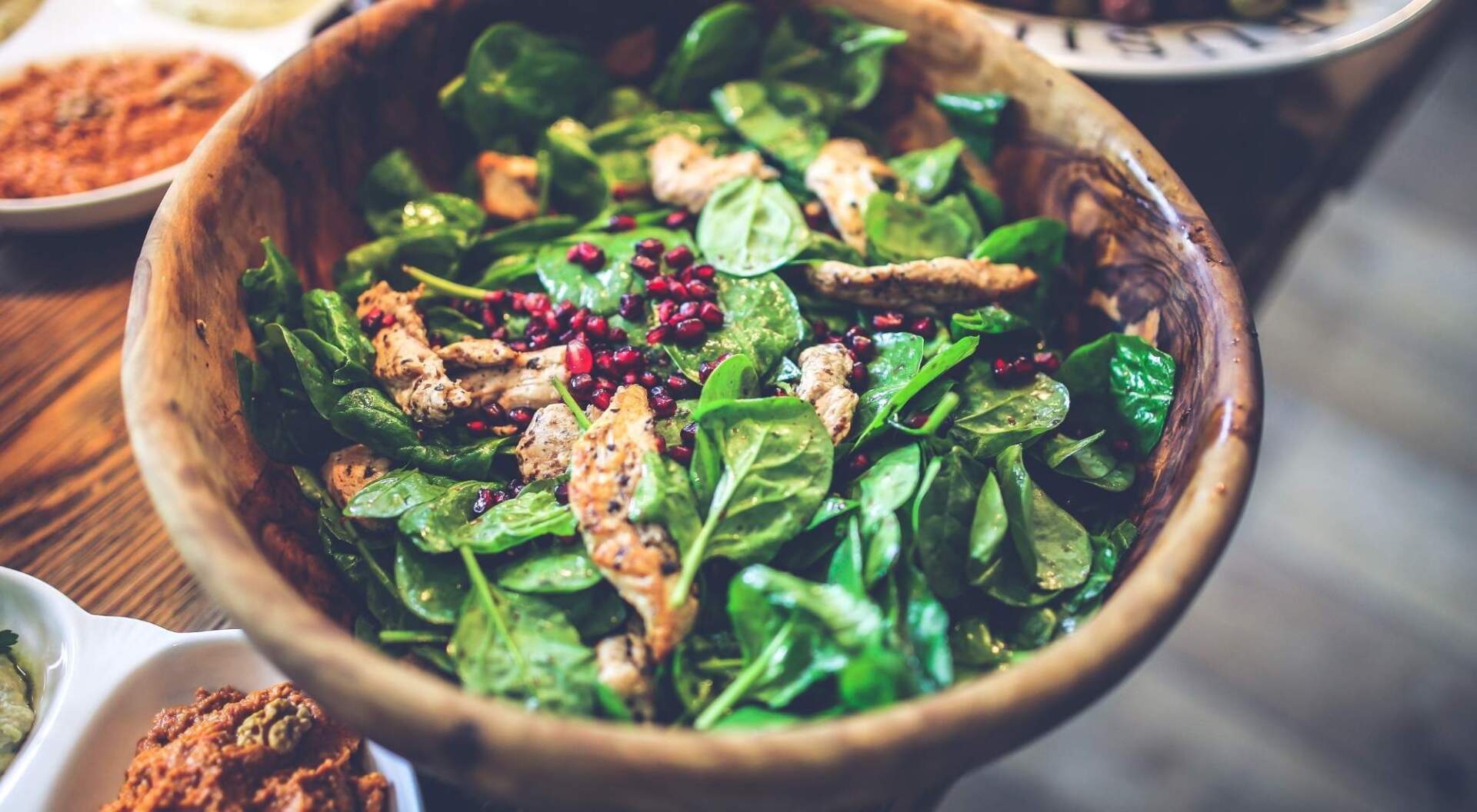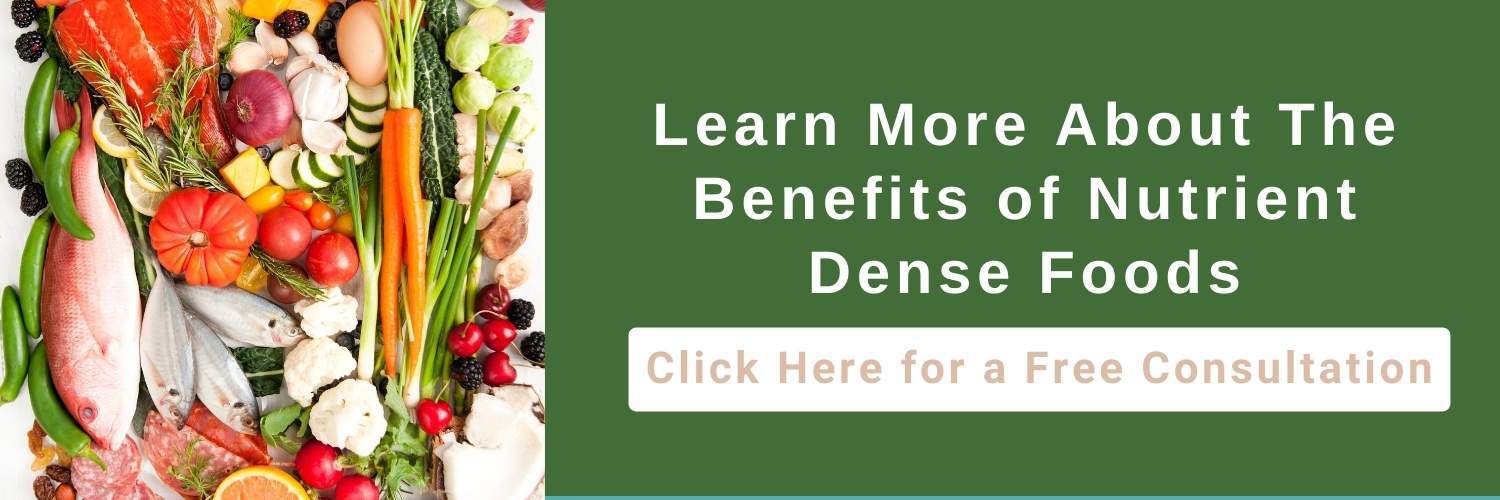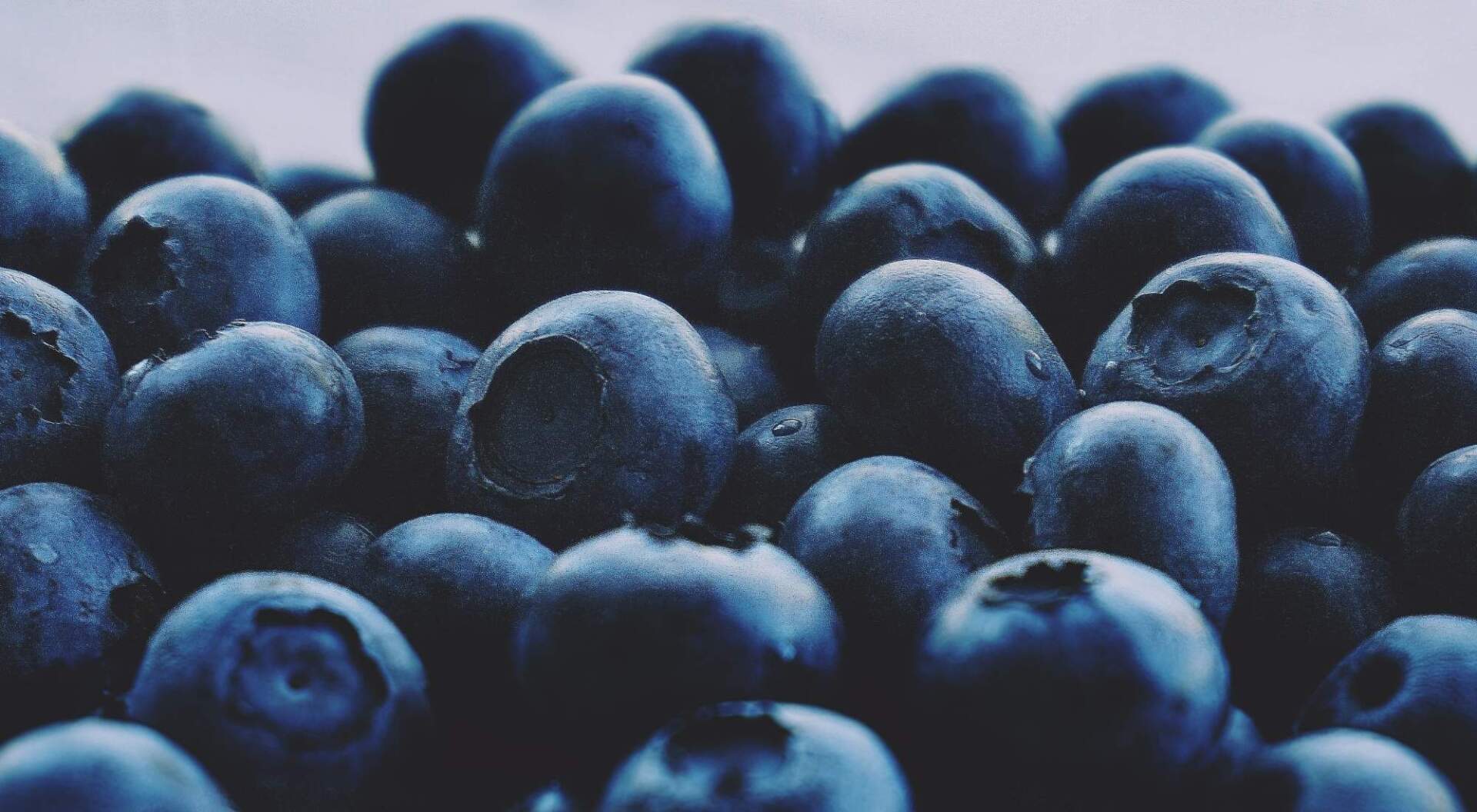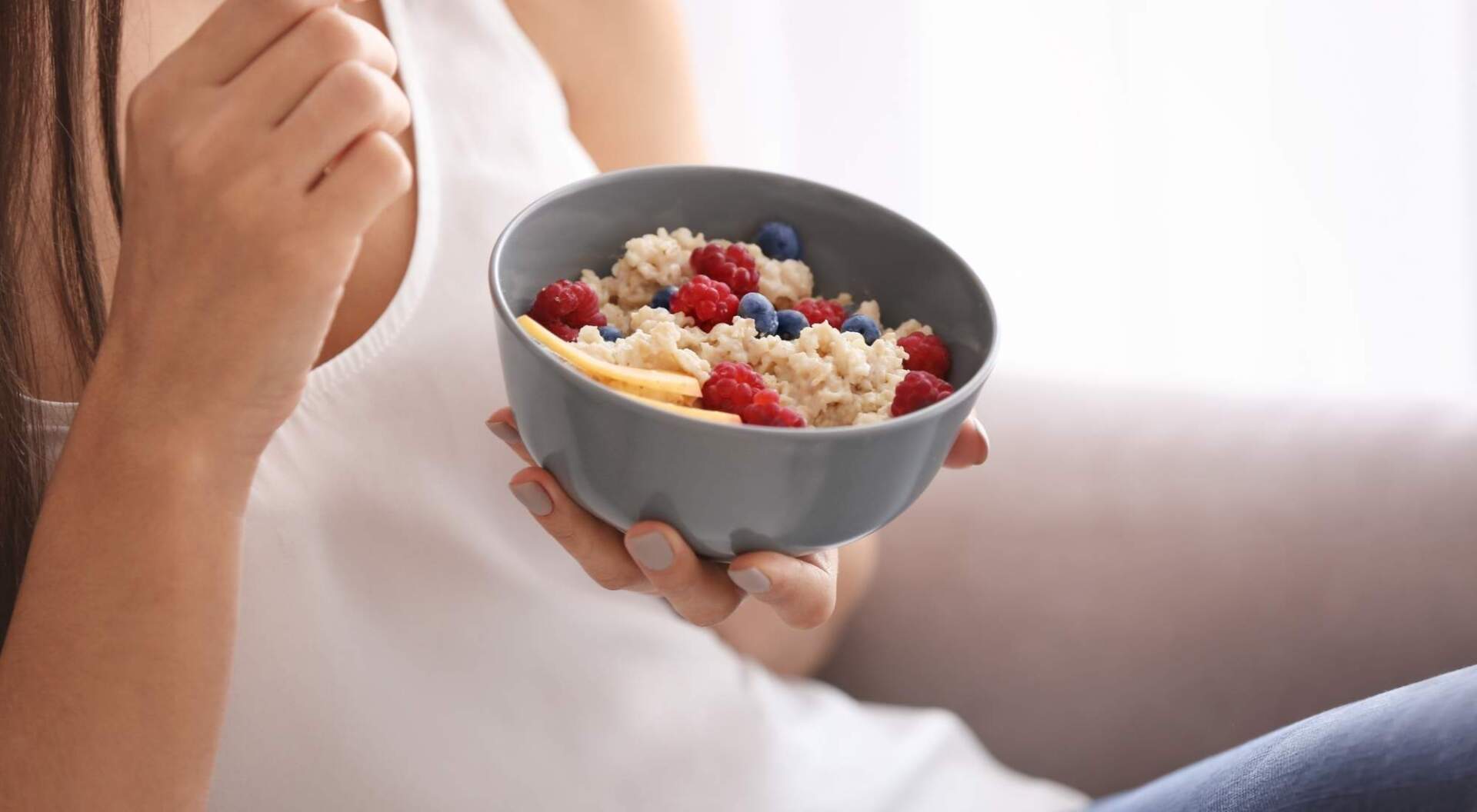Nutrient-Dense Foods: What Are They & Why Is It So Important to Choose Them?
"The content below is not intended to be a substitute for professional medical advice, diagnosis, or treatment. Always seek the advice of your physician or other qualified health provider with any questions you may have regarding a medical condition."
It's no secret that the American diet is notorious for being nutrient deficient.
And while many people think they are doing their bodies a favor by following a certain type of diet, if they’re not consuming a large amount of nutrient-dense foods, they may actually be doing more harm than good.
If you are on a mission to improve your overall health, but not sure where to begin, we think you'll find the information you're looking for here.
We’ll cover the details about nutrient-dense foods, why they’re so important, and give you easy ways to incorporate them into your diet.
Table of Contents
What Is a Nutrient-Dense Diet?
Nutrient-dense refers to the ratio of a food's vitamin and mineral content in relation to the number of calories (or energy) that food contains.
Nutrient-dense foods are high in:
- Vitamins
- Minerals
- Amino acids; and
- Fatty acids
Many people incorrectly assume that eating a diet that is low in calories will help them achieve optimal health.
But the fact is that while nutrient-dense foods are high in nutrients (obviously) — they are also low in calories.
A few examples of nutrient-dense foods include things such as:
- Wild-caught fish
- Beans, peas, and lentils
- Free-range eggs
- Lean grass-fed meat and poultry
- Raw nuts and seeds; and
- Grains like brown rice, quinoa, and buckwheat
Why Are Nutrient-Dense Foods So Important?
You may be wondering, “What’s the big deal about nutrient-dense foods?”
We’re glad you asked!
The fact is that consuming a diet high in nutrient-dense foods (also called an anti-inflammatory diet) may lower your risk for:
- High blood pressure
- Heart disease
- Inflammatory bowel disease
- Depression
- Rheumatoid arthritis
- Cancer
- Diabetes; and
- Obesity
Not only that, but a nutrient-dense food diet can also contribute to:
- Weight loss; and
- Increased energy levels
In order to eat a diet that will best feed every part of your body, you want to be sure to avoid eating excessive calories while focusing on eating foods that are high in nutritional value.
Consider the age-old question,
”Which weighs more? A pound of feathers or a pound of rocks?”
Neither. They both weigh a pound.
Similarly, two foods may have the exact same calorie count, but be as different as night and day when it comes to nutritional value.
For example, 500 calories from a bag of potato chips are nowhere near the same as 500 calories from a bowl of sautéd kale.
If you're curious about how to include more nutrient-dense foods into your diet, HealthierU can help.
Through nutrition response testing,
Dr. Sergi can determine what vital nutrients your body may be lacking, and come up with a plan for how you can improve your health by making the transition to a more nutrient-dense diet.
What Foods Are Most Nutrient-Dense?
Nutrient-dense foods are:
- Unprocessed
- Not chemically altered; and
- Free of synthetic ingredients
While things like fruits and veggies may automatically pop into your mind when you hear nutrient-dense foods, the fact is there are many other foods that qualify as ‘nutrient-dense,’ including:
- Salmon
- Sardines
- Garlic
- Egg Yolks
- Bone broth
- Lentils
- Raw cheese
- Liver; and
- Keifer
6 of the Best Nutrient-Dense Foods
Maybe you're ready to make a change for the better and are wondering, “What are nutrient-dense foods that I need to incorporate into my diet?”
Let’s take a look at six of the most nutrient-dense foods and ways you can incorporate them into your daily menu.
#1: Salmon
Salmon contains:
- Selenium
- Vitamin B12
- Vitamin D
- Niacin
- Vitamin B6
- Phosphorus
- Riboflavin
- Thiamine
- Pantothenic acid
- Potassium
- Copper
- Folate
- Manganese
- Iron; and
- Zinc
Not only is it loaded with vitamins and minerals, but salmon also may:
- Combat ADHD
- Improve your eyesight
- Enhance the health of your bones
- Encourage healthy skin
- Improve brain function; and
- Fight cancer
If you're thinking, “There's no way I could ever eat salmon,” think again. Here are a few recipes that may very well change your mind:
- Garlic Butter Baked Salmon
- Honey Garlic Salmon (two nutrient-dense foods in one recipe!); and
- Salmon Patties
#2: Kale
While you may be tired of hearing of the benefits of kale, don't turn up your nose at this leafy green vegetable.
Kale is loaded with:
- Vitamins, like:
- Vitamin C
- Vitamin K1
- Vitamin A; and
- Vitamin B6
- Minerals, such as
- Calcium
- Copper
- Magnesium; and
- Manganese
- Antioxidants; and
- Fiber
Some great ways to eat kale include:
- Kale chips
- Adding it to a smoothie
- Lemon Garlic Kale Salad; and
- Sautéing finely sliced kale in coconut oil
#3: Garlic
Don't let garlic’s nickname, The Stinking Rose, drive you away.
Garlic has been thought to:
- Lower blood pressure
- Reduce the risk of Alzheimer's disease and dementia
- Decrease inflammation
- Lower cholesterol
- Improve immunity
- Reduce blood clotting
- Increase longevity
- Enhance athletic performance
- Improve bone health; and
- Remove heavy metals from your body
Plus, it tastes delicious!
If you are wanting to add more garlic to your diet, here are some ideas that are sure to please:
#4: Egg Yolks
Next on the list of the best nutrient-dense foods is egg yolks.
Egg yolks? Yes!
The dense nutrients found in egg yolks from free-range, organic hens:
- Contain lutein and zeaxanthin, nutrients that support the health of your eyes and brain
- Are full of Omega-3 fatty acids
- May help relieve inflammation, lower triglycerides and reduce blood cholesterol levels
- Contain carotenoids, which are antioxidants that can help protect against oxidative damage to your cells and improve eye health; and
- Contain choline, which is an important micronutrient for brain and liver function
If you're wondering how to incorporate more egg yolks into your diet, try these ideas:
- Hard-boiled eggs
- Keto Egg Salad; or
- Baked Eggs with Mushrooms and Spinach
#5: Blueberries
It probably comes as no surprise to you that blueberries are one of the top nutrient-dense foods.
These tiny, sweet morsels are high in antioxidants, and they also contain:
- Fiber
- Vitamin C
- Phosphorus
- Zinc
- Iron
- Magnesium
- Vitamin K
- Manganese; and
- Potassium
And here are just a few of the possible benefits you may experience by including blueberries into your diet:
- Reduction in DNA damage
- Protection of your body's good cholesterol
- Lowering blood pressure
- Preventing heart disease
- Improving memory function
- Stabilizing blood sugar
- Fighting urinary tract infections; and
- Reducing post-exercise muscle damage
A few easy ways to incorporate blueberries into your nutrient dance diet include:
- Throwing a handful into your morning smoothie
- Eating a bowl as a bedtime snack; and
- Blueberry Chia Seed Pudding
#6: Liver
Did you know that organ meats, such as liver, are one of nature's most powerful nutrient-dense foods?
What exactly makes liver so good for you? Here are just a few of liver’s many benefits:
- It is high in active vitamin A. Found only in animal sources, active vitamin A can help:
- Reduce free radical damage
- Fight inflammation
- Protect your vision
- Improve thyroid health
- Build strong bones; and
- Support immune function
- Liver is a great source of vitamin B12, which is necessary for cellular function and blood cell formation
- It is high in Vitamin B6, folate, and biotin, all three of which are important for proper cellular function
- Liver is a good source of protein
- It is a rich source of CoQ10, an antioxidant known for:
- Helping to treat heart failure
- Improving fertility
- Enhancing the appearance of your skin
- Reducing headaches
- Increasing exercise performance
- Helping to manage diabetes; and
- Possibly helping to prevent cancer
How to Add Nutrient-Dense Foods to Your Diet — Our Top 4 Tips
Adding nutrient-dense foods into your diet doesn’t have to be complicated.
Here are a few super easy ways to incorporate more nutritious foods into your diet.
#1: Make Simple Swaps
Simply bring in nutrient-dense foods to replace foods you’re already eating, such as:
- Brown rice or cauliflower rice to replace white rice
- Kale in place of iceberg lettuce; or
- Adding the egg yolks to your egg white omelet
#2: Incorporate More Fermented Foods
What’s all the hype about fermented foods? Fermented foods:
- Are a great source of lactic acid
- Are teeming with probiotics
- Enhance digestion; and
- Improve your immunity
Consuming fermented foods is an easy way to up the nutrient-dense foods in your diet.
Try fermented drinks, such as …
- Kombucha
- Water Kiefer; and
- Milk Kiefer
- Tepache; and
- Beet Kvass
… or foods, like …
- Sauerkraut
- Kimchi; and
- Miso
#3: Choose Foods That Contain Fat-Soluble Vitamins
Foods containing fat-soluble vitamins are high in antioxidants and benefit your body by:
- Encouraging normal tissue growth
- Supporting your immune system; and
- Preventing the premature aging of your cells
Choose foods such as …
- Avocados
- Raw Nuts; and
- Sweet potatoes
… to incorporate those nutrients into your diet.
Start on a Path to Better Health With a Nutrient-Dense Diet and the Help of HealthierU
If you are ready to change your health by changing your diet, you have come to the right place.
At HealthierU, helping patients just like you feel better is our specialty.
Through Nutrition Response Testing, Dr. Donna Sergi can help formulate a personalized dietary plan of nutrient-dense foods to get you on the path to robust health.
And our holistic approach is :
- Safe
- All-natural; and
- Highly effective
Contact us today for your complimentary consultation!






